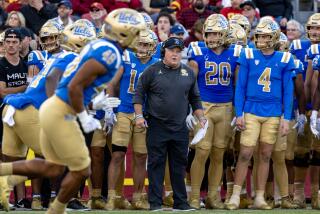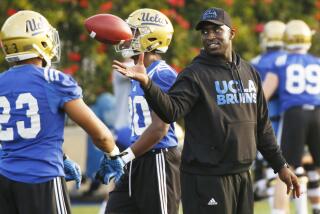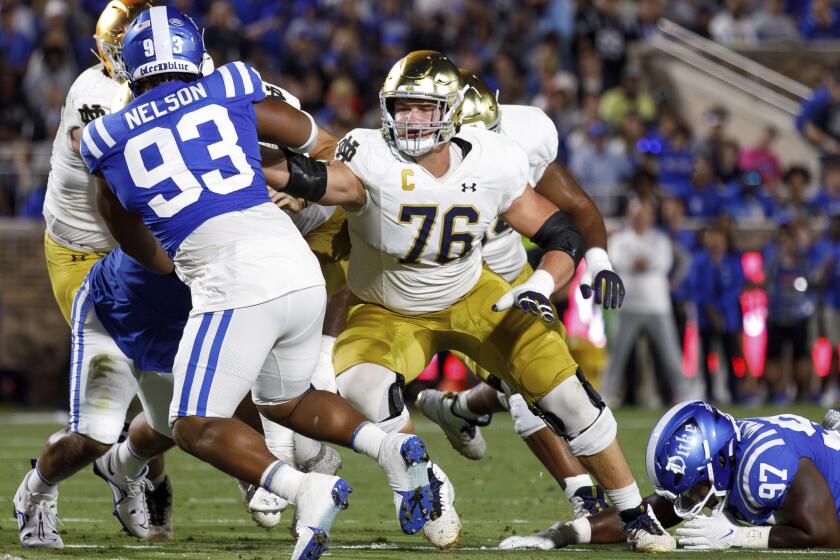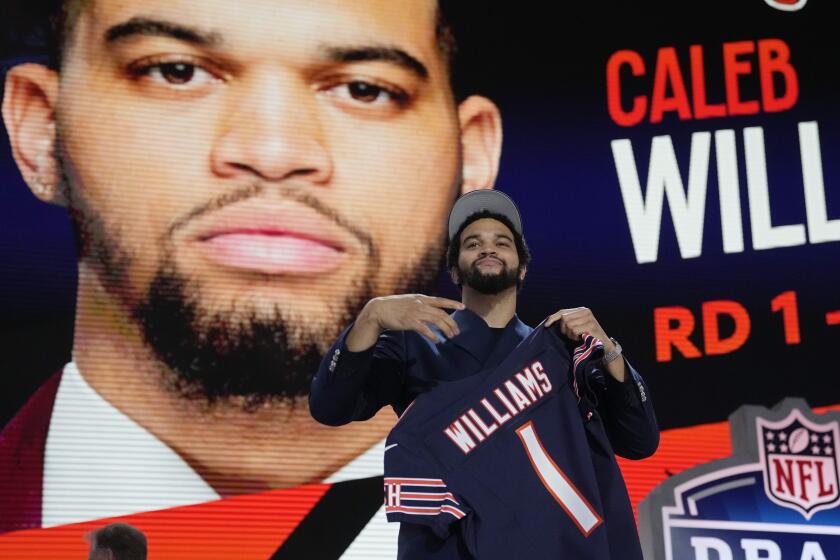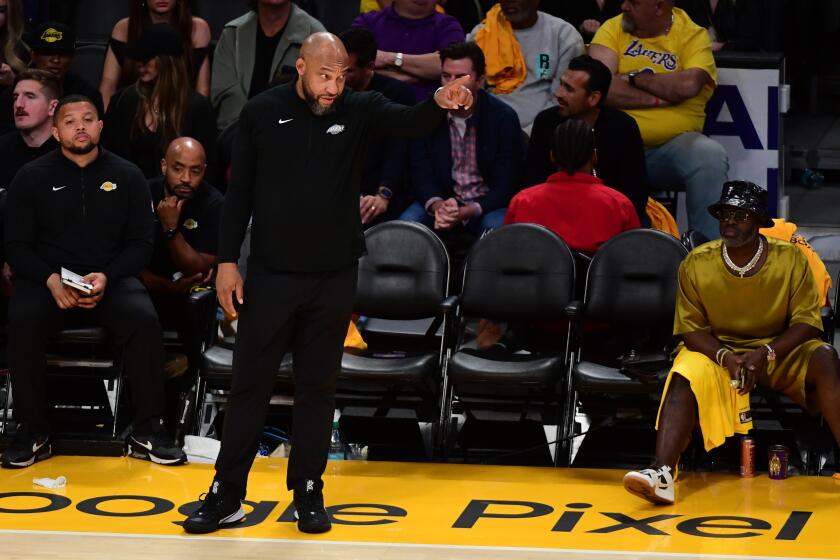Urban Meyer puts Ohio State on cream puff diet, leaves bitter taste
Unbuckling the mailbag:
Question: I hope you and the media start a campaign to stop the NCAA scheduling these massacre football games. It is a scam, a sham and a shame. . . . Urban Meyer has the guts leading, 55-0, to go for it on fourth and six? He should be suspended for a game for that humiliation.
Bobby Herbeck
Answer: I’ll start the campaign about these silly “paycheck” games, but first things first: You owe the Ohio State coach a big apology.
Meyer did not — I repeat, did NOT — allow his team to “go for it” on fourth and six with the Buckeyes leading, 55-0, last week against Florida A&M.;
Ohio State was up only 48-0 at the time, and it was fourth and five.
Kenny Guiton completed a 15-yard pass and that led to the touchdown that made it 55-0 just before the half.
Q: Your story on the Georgia Tech massacre of Cumberland College was interesting — 220-0 is an astounding score. How is it possible to score an average of 10 touchdowns a quarter?
Paul Hovsepian
A: And Bobby Herbeck thinks Meyer was piling on? One problem was that Cumberland did not come properly equipped or prepared to that 1916 game in Atlanta. According to the book “Heisman, the Man Behind the Trophy,” Cumberland left campus in Tennessee and hoped to pick up some extra players when changing trains in Nashville. Instead, three players missed the connection. The Bulldogs arrived in Atlanta with only 15 players, 13 of which were Cumberland law students.
Then came a couple of bad breaks: Cumberland starting quarterback Charlie Edwards was knocked out trying to block on the opening kickoff.
Cumberland got the ball first and gained three yards on first down. It was the Bulldogs’ longest gain of the day.
Every time Georgia Tech scored, Cumberland elected to kick the ball back to the Yellow Jackets, which was permitted under the rules.
Georgia Tech led, 63-0, after the first quarter and it sort of snowballed from there.
Q: Not sure whether you have participated in college athletics or just reported those events? But to characterize these programs as a pile-it-on would indicate that you have never performed in front of 100,000 people on a Saturday afternoon.
Ed Mascio
A: I did participate in college athletics but have to admit we never played in front of 100,000 in our intramural Ultimate Frisbee league.
Q: What’s your coaching record?
Charles L. Freeman
A: I retired with a perfect 1-0 record, no worse than a tie for the best winning percentage in history. My crowning achievement came a few summers ago at my son’s junior varsity high school basketball tournament in Palm Springs.
Tom Gregory, then Chino Hills Ayala High’s varsity coach, asked me if I could coach a split-squad JV team because he was short on coaches. I gathered the boys up, looked them in the eye, and told them to pick the starting lineup.
It was a running clock, 20 minutes per half, and I told the players to substitute in and out any time they wanted.
I never called a timeout and we cruised to an easy victory.
Any time I read about a coach losing his first game, in any sport, at any level, I raise a champagne toast knowing my perfect record is safe.
Q: I wonder how the NCAA has the power to fine Penn State $60 million? How do these guys have the horsepower to fine a state institution?
H.C. Warren
San Diego
A: Here’s what happened: Mark Emmert, a newly appointed NCAA wizard with a shiny wand, decided to junk the rule book in the Penn State sex-abuse scandal. Everyone agreed what happened was despicable and something needed to be done. But instead of going through the normal channels of due process — it used to take years to process cases — Emmert named himself King of Infraction Enforcement and handed down extraordinary, unprecedented penalties.
As I recall, Emmert figured $60 million was how much football revenue the school would produce over the course of the sanctions. Emmert also instituted a four-year bowl ban and the loss of about 80 scholarships.
“It’s good to be king,” as they used to say in medieval times.
You can understand why USC cried foul this week when the NCAA decided to restore some scholarships to Penn State. USC in 2010 was hit with a two-year bowl ban and the loss of 30 scholarships in the Reggie Bush case.
Penn State has skewed forever, and perhaps irrevocably, how future NCAA cases can be viewed and decided. By going outside his boundaries, Emmert elevated the sanctions business to a different level of chaos.
In my opinion, though, no case should ever be compared with Penn State’s.
USC has a better argument against the football-related sanctions by citing the cases of Ohio State, Oregon, and we’ll see about Miami.
The NCAA set out to make an example of USC but keeps moving the goal posts.
The NCAA is broken, in case you haven’t heard, and few people think Emmert is the man who can fix it.
Q: The NCAA committee on infractions is a joke. Look what happened to Auburn and Cam Newton. Nothing.
Norman Hensley
Santa Monica
A: There’s an old saying out there: It’s cheating only if you get caught.
Q: I’ve come to the realization that @DufresneLATimes is the least knowledgeable college football writer out there. Congratulations!
Twitter: @StumpTheRob
A: Thanks. I was hoping you could recommend some easy-reader books to help me improve my college football knowledge. I already have these: “See Johnny Football Run,” “Green Helmets and Ham,” “The Cat in Les Miles’ Hat,” “Charlie Weis and the Chocolate Factory,” “The Very Hungry Cornhusker” and “Chicka Chicka Boomer Sooner.”
Q: It was Darrell Royal, not Woody Hayes, who cited the “three bad things” rule. Like your work, even though you hate Notre Dame.
Bill Even
A: I never said Hayes invented or even coined the phrase, “Three things happen when you pass and two of them are bad.”
I wrote that he used to say it, which he did.
There is actually debate over where the saying originated. My research staff engine over at Google reports it was Royal, the great Texas coach, who was first quoted in the early 1960s using the phrase.
The first attribution to Hayes comes in 1966. However, in a 2005 interview with Columbus Dispatch reporter Todd Jones, Royal gave credit to Hayes for coining the phrase.
“I’m just a model of the people I’ve been around in my life, and Woody was one of those people,” Royal said.
The story concludes: “Royal credits Ohio State’s Hayes, his contemporary and friend, with being the first one to say three things can happen on a pass and two of them are bad.”
I don’t hate Notre Dame, but I hate it when I’m right, even when I’m not trying.
Q: May we someday revisit the “Mike Riley, best coach in Pac-12” discussion?
Dexter Fishmore
A: Sorry, we keep strict revisiting hours, and right now they are between 3 and 5 every Sunday morning.
I know you sent this email in a fit of anger, with Oregon State trailing San Diego State late in last Saturday’s game.
And I know you know Oregon State came back and won.
Q: Stats are for losers. Alabama is defending champ and already won at A&M.; Let it play out.
Twitter: @RuleSevenDoog
A: Stats are for winners and losers. Alabama had no problem pointing out it was winning national titles with the No. 1 defense in the country. This week, the Crimson Tide is No. 56 on defense but still No. 1. Stats are what they are.
More to Read
Get our high school sports newsletter
Prep Rally is devoted to the SoCal high school sports experience, bringing you scores, stories and a behind-the-scenes look at what makes prep sports so popular.
You may occasionally receive promotional content from the Los Angeles Times.

